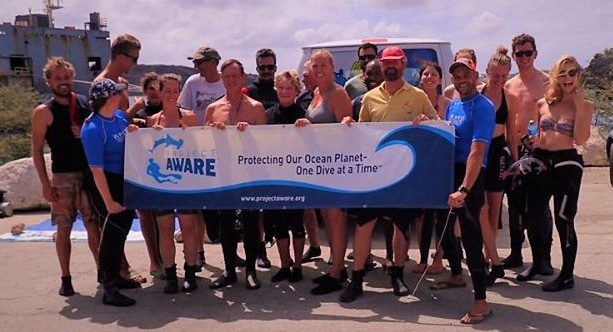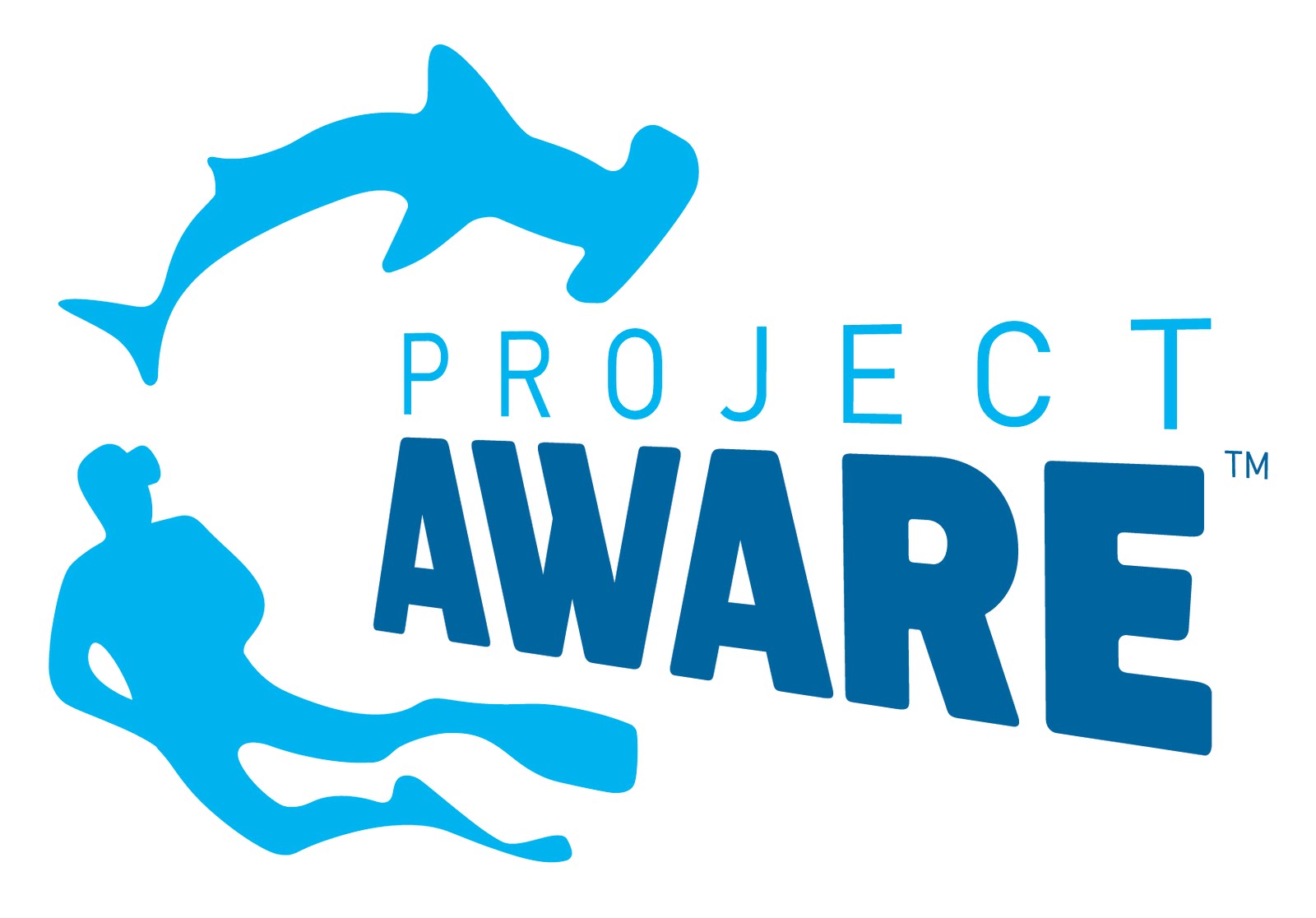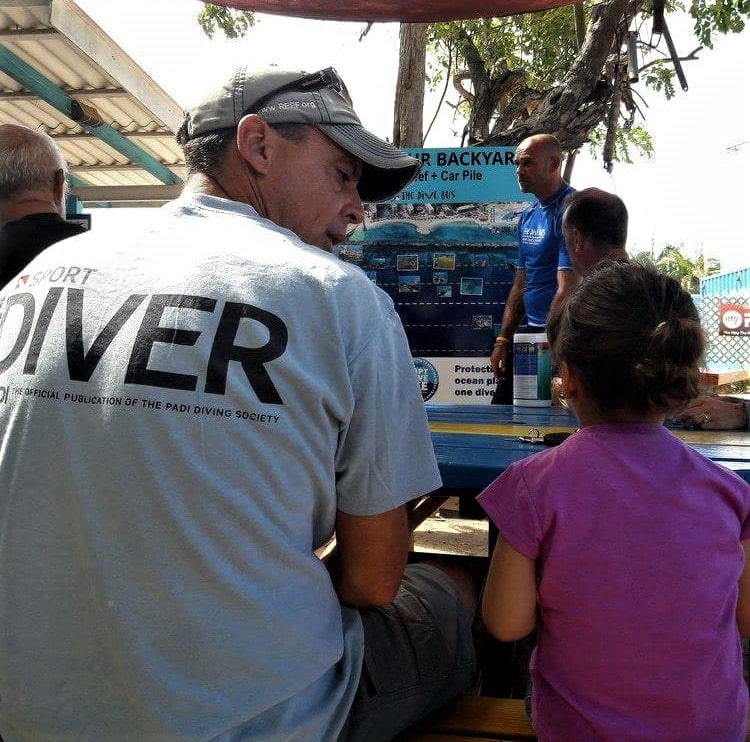Marine Life & Conservation
Curaçao key for Shark Conservation

 Top Dive Destination Prepares to Host Community and Policy Action for Sharks
Top Dive Destination Prepares to Host Community and Policy Action for Sharks
The small Dutch Caribbean nation of Curaçao is poised to play a huge part in the future survival of endangered shark species in 2019, with the island due to host both the Annual Curaçao International Dive Festival as well as the 26th annual meeting of ICCAT, the international fishery management body responsible for overseeing commercial fisheries in the Atlantic Ocean.
As part of the Festival, September 29 – October 5, 2019, Project AWARE®, the international non-profit organization working to create positive change for the ocean through local and global action, will be launching a newly revised shark conservation course for the diving community.
Project AWARE partners in Curaçao currently participate in ongoing Dive Against Debris® surveys, where dive operators across the country record and report critical data on marine debris found on the seabed to ensure the health of the country’s marine habitats, and this year they will also be focusing on some of the most vulnerable species in the ocean, sharks.
“This year, Curaçao could potentially play a huge effort in reducing unsustainable fishing on endangered shark species, especially Mako sharks, the fastest shark in the ocean,” said Ian Campbell, Project AWARE’s Associate Director of Policy and Campaigns. “In October, we’ll be launching our newly revised AWARE Shark Specialty for the diving community which will include lots of information on the main threats facing many shark species, but also what divers and the wider community of ocean lovers can do to be part of the solution, including taking part in Project AWARE’s citizen science initiatives.”
“The Curaçao International Dive Festival is a huge event that brings together like-minded ocean lovers for a week of festivities focused on protecting the ocean, and then, a few weeks later, government representatives from fifty-two countries will meet here to discuss fishing quotas for Atlantic tuna and other species including Mako sharks.” Bryan Horne, Creator and Founder of the Dive Curacao Network. “The ministers making these decisions are all public servants, and we want to ensure that they hear, loud and clear, the message that the Curaçao community and international dive community want them to hear.”
ICCAT, the International Convention for the Conservation of Atlantic Tuna, is responsible for managing tuna and tuna-like species in the Atlantic Ocean and the surrounding areas, and the annual meeting will be held in Curaçao between the 18th – 25th November.
Campbell added “ICCAT fishery managers have continued to neglect their responsibility to manage catches of Mako sharks, with the Atlantic populations recently being downgraded to “Endangered” on the IUCN Red List of Threatened Species. It’s time they started listening to the public and impose a ban on catching these species before it’s too late.”
Tadzio Bervoets, former Chair of the Dutch Caribbean Nature Alliance and project lead for the Dutch Caribbean Save our Sharks Project echoed Horne and Campbell’s statements mentioning the importance of protecting sharks on Curacao and the Caribbean Region as a whole; “The Caribbean Sea in general is a biodiversity hotspot for sharks in the Atlantic Basin. During our research initiatives we have tagged sharks with satellite transmitters in the North Eastern that have migrated all the way south to the Northern Coast of Venezuela. This research shows that the species using the whole Caribbean basin as a migratory pathway, highlighting the importance for regional conservation for some of the most threatened apex predators in the ocean.”
“Therefore all conservation practitioners look forward to the ICCAT meeting as well as participating in the Curacao International Dive Festival working both on increasing regional and international conservation measures of the species while simultaneously engaging the diving community to lobby for the protection of these species which are so critically important for the Caribbean Sea and wider Atlantic Basin,” mentioned Bervoets.
For more information about Project Aware visit their website by clicking here.
Marine Life & Conservation
Paul Watson Released as Denmark Blocks Japan’s Extradition Bid

Renowned anti-whaling activist Paul Watson has been released from custody in Greenland after spending five months in detention. Denmark’s Justice Ministry rejected Japan’s request for his extradition, citing insufficient guarantees that his time already served in custody would be credited against any potential sentence.
The 74-year-old Canadian-American was arrested on July 21 in Nuuk, Greenland’s capital, when his ship docked to refuel. His arrest was based on a 2012 Japanese warrant related to a 2010 encounter in Antarctic waters. Japan alleged Watson obstructed operations and caused damage to a whaling research ship during efforts to disrupt illegal whaling. Watson has consistently denied these claims, maintaining his commitment to marine conservation.
Denmark, which oversees extradition matters for Greenland, concluded that while the legal conditions for extradition were met, the lack of assurances from Japan regarding time-served credit made extradition untenable.
In a video shared by his foundation, Watson expressed gratitude and relief, saying, “After five months, it’s good to be out… and good to know they’re not sending me to Japan.” He added that the most difficult part of his time in custody was being separated from his two young sons.
Watson is a pioneering figure in marine conservation, known for founding the Captain Paul Watson Foundation in 2022 after decades of activism with the Sea Shepherd Conservation Society. His bold efforts to defend marine life have earned him widespread support, including from celebrities and conservationists. His work has also been featured in the acclaimed reality TV series Whale Wars.
Watson’s lawyer, Jonas Christoffersen, praised the decision, stating, “We are happy and relieved that Paul Watson is now free.” He added that Watson is eager to reunite with his family and continue his vital work.
The arrest occurred while Watson’s vessel, the M/Y John Paul DeJoria, was en route to the North Pacific with a team of 26 volunteers to intercept a Japanese whaling ship. His foundation described the arrest as politically motivated and emphasized that Watson’s actions were focused on ending illegal whaling practices.
Japan resumed commercial whaling in 2019 after leaving the International Whaling Commission, asserting that whale meat is a cultural tradition. Conservationists, however, continue to challenge these practices, highlighting their impact on marine ecosystems.
Despite the challenges, Watson remains steadfast in his mission to protect marine life and bring attention to whaling practices. His dedication to ocean conservation has made him a globally respected advocate for the environment.
Marine Life & Conservation
12 Days of Zero-Waste Fish-mas

This holiday period, the Marine Conservation Society, the UK’s leading ocean membership charity, invites you to make some simple changes to eating fish this Christmas to help our seas.
Dr Kenneth Bodles, Head of Fisheries and Aquaculture at the Marine Conservation Society, said, “During the festive season, our consumption increases, but so does waste. Sustainability isn’t just about where food comes from – it’s also about how you use it. By reducing waste and making the most out of your seafood, you’re not only taking steps to be more ocean-friendly, but can also help to cut costs during what is often one of the most expensive times of the year”.
The Marine Conservation Society has compiled twelve tips on how to consume seafood sustainably with zero-waste this Christmas:
Buy whole fish instead of fillets
Instead of fillets, consider buying whole fish such as salmon, hake, or lemon sole. By adopting a “nose to tail” approach with cooking, whole-baked fish not only feeds a crowd, but also helps to minimise waste and maximise sustainability by using up every part of the animal, including bones, skin, and fat.
Make fish stock
Leftover fish bones or shells can be put to good use by boiling them to make a nourishing fish stock or bisque. This can be frozen and preserved for later use and makes for a flavourful base in a soup.
Make your own fish pâté
Avoid waste by turning leftover fish, such as smoked mackerel or salmon, into a delicious pâté by blending with cream cheese and lemon. Perfect when paired with crackers.
The sustainability of salmon and mackerel varies depending on where and how it is caught or farmed. For more information on green-rated options, check the charity’s Good Fish Guide.
Buy frozen
By purchasing seafood that is frozen or vacuum-packed, this helps to reduce waste by extending the shelf life of your food.
Fish pie
If you’re wondering what to do with leftover cooked fish, why not opt for a classic fish pie with mashed potatoes, leeks, and a cheesy sauce? A sure crowd pleaser on Boxing Day.
Use the head
Don’t forget the fish head! The meat is incredibly tender and flavourful. The charity recommends a cod’s head curry or recreating Fallow’s renowned cod’s head in siracha butter.
By stretching your ingredients further, not only is this a more sustainable way to enjoy seafood, but also cost-effective by repurposing leftovers and cooking creatively.
Boxing Day brunch
Mix leftover kippers or smoked salmon with scrambled eggs for a tasty, zero-waste, Boxing Day brunch.
For best choice, make sure you buy kippers, or herring, from the North Sea and the North Irish Sea.
Zero-waste storage
A top tip from the Marine Conservation Society to avoid waste is freezing fish offcuts to save for future use.
Crisp up the skin
Even leftover fish skin can be turned into a quick savoury snack by crisping it up in an air fryer with a little olive oil and salt.
Anchovies two ways
Leftover anchovies can either be blended with butter to make a delicious anchovy butter or tossed into pasta for a hit of umami flavour.
The charity recommends opting for anchovies caught in the Bay of Biscay for best choice.
Fishcakes
For an easy, zero-waste meal, leftover seafood trimmings can be mixed with mash and fried in breadcrumbs to make fishcakes.
Pickled mussels
Try pickling mussels in 1:1 vinegar and water, with a dash of sugar for a sustainable, zero-waste snack that can be enjoyed well beyond the festive season.
Mussels farmed in the UK are a seafood superhero. Grown using low-impact methods and harvested by hand, they get all the food they need from the sea around them. This makes them one of the most sustainable, ocean-friendly, and cost-effective seafood options.
Players of People’s Postcode Lottery have raised £6.6M towards the Marine Conservation Society’s vital work in making seafood more sustainable.
Laura Chow, Head of Charities at People’s Postcode Lottery, said: “Fish is a festive favourite for many, but making sustainable choices when it comes to how we buy and eat seafood makes all the difference for our ocean. Support from players of People’s Postcode Lottery has helped the Marine Conservation Society further its sustainable seafood work, so that we can all enjoy healthier, better protected seas.”
The Marine Conservation Society encourages you to make sustainable seafood choices a year-round habit, not just for Christmas. To check how sustainable the seafood on your plate is, you can visit the charity’s Good Fish Guide. The Guide helps consumers and businesses identify the most sustainable seafood using a simple traffic light system, based on where and how species are caught or farmed. Green is the best choice, amber means improvements are needed, and red indicates fish to avoid buying.
Zero-waste gift idea
Why not embrace a zero-waste Christmas by gifting a membership to support marine conservation? It’s a meaningful, low-waste gift that helps protect our ocean for generations to come. Memberships start from as little as £5 a month – the price of a sandwich and drink from your local coffee shop.
Find the latest sustainable seafood advice for wild-caught and farmed seafood on the Good Fish Guide, downloadable to your phone from www.mcsuk.org/goodfishguide.
-

 News2 months ago
News2 months agoIconic SS United States to become the World’s Largest Artificial Reef
-

 News3 months ago
News3 months agoBook Review – 52 Assignments: Underwater Photography
-

 Gear News3 months ago
Gear News3 months agoDYNAMICNORD – New German diving brand enters the British market
-

 News3 months ago
News3 months agoExploring Cenote El Pit: A Diver’s Dream
-

 Gear News3 months ago
Gear News3 months agoTry BARE drysuits (and maybe even win one!) this Friday with Sea & Sea at North West Dive Fest
-

 Marine Life & Conservation3 months ago
Marine Life & Conservation3 months agoBook Review: Coral Triangle Cameos
-

 Blogs2 months ago
Blogs2 months agoDive the Egyptian Red Sea this Autumn with Regaldive
-

 News3 months ago
News3 months ago2024 Ocean Art Underwater Photo Competition Announced





